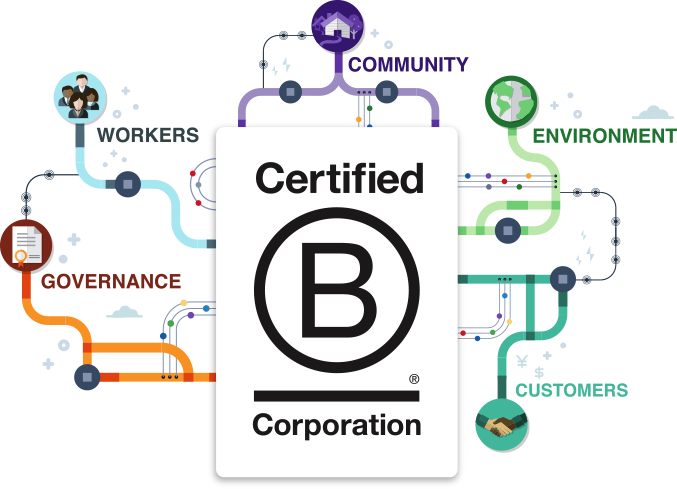Business for Good, Part 1: Certified B Corporations
On a recent trip to Scotland, Craig Olson of the Island Institute’s Small Business team was inspired by the Social Enterprise businesses in the UK. So, we decided to use the next few Commercial Currents to explore the concept of “business for good.” This month, we are going to talk about Certified B Corporations, or B Corps, and then next month, we’ll tackle the Social Enterprise concept.
We all know that most of the world’s problems can’t be solved by government organizations or nonprofits alone—at every level, whether it be local, regional, national, or global, both individuals and businesses need to play a role in these conversations. So what exactly is a business’s responsibility in this landscape?
What is a Certified B Corporation?
Many business models have proven it’s possible to be successful by prioritizing things other than profits and shareholders alone. You may have heard of the idea of a triple bottom line—an accounting framework with three parts: social, environmental (or ecological), and financial. By using structures like this to evaluate performance in a broader perspective, businesses like Patagonia and Ben and Jerry’s are showing us that it can be profitable to prioritize stakeholders and the environment before profits. One thing these companies also have in common is that they’re both Certified B Corporations, or businesses that, unlike traditional corporations, use the power of business to address social and environmental problems.
While the idea of “business for good” isn’t a new concept, the standards around what that means are still relatively new. An analogy commonly used is that B Corp Certification is to business what Fair Trade certification is to coffee or USDA Organic certification is to milk. This is a nice way of thinking about it—you don’t incorporate your business to be a B Corp, it’s a certification that your for-profit social enterprise can apply to get.
In order to be certified as a B Corp, each company completes a B Impact Assessment and is then scored against other businesses that have taken the assessment. The company then gets an Overall B Impact Score, which is broken down into different categories: Governance, Workers, Community, and Environment. This isn’t a one-time certification though—companies can re-take the Impact Assessment year after year. Ben and Jerry’s has taken it three times since 2012, and each time they have seen improvements in their score, which means that organizationally they’re making changes to help create a more inclusive and sustainable business.
Why would a business become a B Corp?
The data shows that people, particularly millennials, are using their buying power to support socially and environmentally conscious brands and products. The days where the best price always wins are declining. Today, many consumers want a compelling story behind the products they buy and will spend more if they know what they’re buying is sustainable or will have a social impact in their communities or where it is produced.
Administered by the nonprofit B Lab, B Corp Certification doesn’t just evaluate a product or service; it assesses the overall positive impact of the company that stands behind it. Through a combination of third-party validation, public transparency, and legal accountability, Certified B Corps build trust and value.
B Corps in Maine
A few Maine-based companies are paving the way in becoming B Corps. Coffee By Design, based in Portland, has been a Certified B Corporation since July 2016. In addition to only roasting sustainably-sourced and traceable coffee, they also place a large emphasis on supporting the community and its artists. Two other Maine companies designated as B Corps are Revision Energy, based in South Portland, and Insource Renewables, based in Pittsfield. Like Coffee By Design, Revision was one of the early Maine companies to become a B Corp, and was certified in July 2015. Insource, one of the newer companies to be added to the list, recently received its certification in May 2019. Both full-service renewable energy contractors, these companies are actively engaged in the development of responsible solar policy in Maine and are also employee-owned, with Insource in the final stage of its transition to a worker-owned cooperative.
Other Maine companies on the B Corps list include: Tom’s of Maine; Wicked Joe Organic Coffees; Portland-based temp agency MaineWorks; and Brunswick-based outdoor apparel manufacturer Atayne. Take a look at the B Corps website or visit these individual companies to learn about their business models and how they are working to change the business landscape—here in Maine and elsewhere.
What this means for Maine’s small businesses
As we’re creating new businesses and revamping existing ones along the Maine coast, it’s crucial to be able to tell a compelling social or environmental story around what we’re making or the service we’re providing. Our location gives us an inherent advantage, so, figuring out the best way to use this advantage offers great potential in helping us grow our businesses and move forward with these changing economic standards.
Feel free to reach out to Craig Olson or Claire Donnelly if you’re interested in chatting more about how to drive your business forward with a social mission, and stay tuned for a deeper look into the concept of Social Enterprise next month.
Featured Resources
- Certified B Corporation website
- B Corporation Certification Requirements
- B Corp Directory
- Benefit Corporations and Certified B Corps
Further questions?
Contact Craig Olson or Claire Donnelly with the Small Business team.
What We Do
The Island Institute’s Small Business Team provides business and financial planning to help entrepreneurs navigate the complexities of starting and growing a business. For more information on our small business support services, feel free to contact Craig Olson.
Commercial Currents is an email and blog newsletter that shares buoyant stories from Maine’s island and coastal communities about economic stability and resilience. To find archived editions, go to islandinstitute.org/blog/economic.
Know someone who’d enjoy these emails? Subscribe here.


